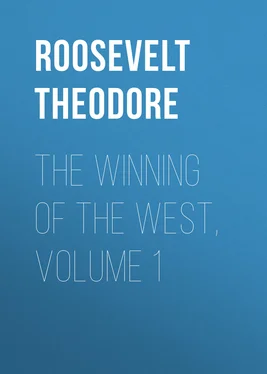Theodore Roosevelt - The Winning of the West, Volume 1
Здесь есть возможность читать онлайн «Theodore Roosevelt - The Winning of the West, Volume 1» — ознакомительный отрывок электронной книги совершенно бесплатно, а после прочтения отрывка купить полную версию. В некоторых случаях можно слушать аудио, скачать через торрент в формате fb2 и присутствует краткое содержание. Жанр: foreign_prose, История, foreign_edu, foreign_antique, на английском языке. Описание произведения, (предисловие) а так же отзывы посетителей доступны на портале библиотеки ЛибКат.
- Название:The Winning of the West, Volume 1
- Автор:
- Жанр:
- Год:неизвестен
- ISBN:нет данных
- Рейтинг книги:5 / 5. Голосов: 1
-
Избранное:Добавить в избранное
- Отзывы:
-
Ваша оценка:
- 100
- 1
- 2
- 3
- 4
- 5
The Winning of the West, Volume 1: краткое содержание, описание и аннотация
Предлагаем к чтению аннотацию, описание, краткое содержание или предисловие (зависит от того, что написал сам автор книги «The Winning of the West, Volume 1»). Если вы не нашли необходимую информацию о книге — напишите в комментариях, мы постараемся отыскать её.
The Winning of the West, Volume 1 — читать онлайн ознакомительный отрывок
Ниже представлен текст книги, разбитый по страницам. Система сохранения места последней прочитанной страницы, позволяет с удобством читать онлайн бесплатно книгу «The Winning of the West, Volume 1», без необходимости каждый раз заново искать на чём Вы остановились. Поставьте закладку, и сможете в любой момент перейти на страницу, на которой закончили чтение.
Интервал:
Закладка:
The grades of society were much more clearly marked than in similar communities of our own people. The gentry, although not numerous, possessed unquestioned social and political headship and were the military leaders; although of course they did not have any thing like such marked preeminence of position as in Quebec or New Orleans, where the conditions were more like those obtaining in the old world. There was very little education. The common people were rarely versed in the mysteries of reading and writing, and even the wives of the gentry were often only able to make their marks instead of signing their names. 31 31 See the lists of signatures in the State Department MSS., also Mason's Kaskaskia Parish Records and Law's Vincennes. As an example; the wife of the Chevalier Vinsenne (who gave his name to Vincennes, and afterwards fell in the battle where the Chickasaws routed the Northern French and their Indian allies), was only able to make her mark. Clark in his letters several times mentions the "gentry," in terms that imply their standing above the rest of the people.
The little villages in which they dwelt were pretty places, 32 32 State Department MSS., No. 150, Vol. III., p. 89.
with wide, shaded streets. The houses lay far apart, often a couple of hundred feet from one another. They were built of heavy hewn timbers; those of the better sort were furnished with broad verandas, and contained large, low-ceilinged rooms, the high mantle-pieces and the mouldings of the doors and windows being made of curiously carved wood. Each village was defended by a palisaded fort and block-houses, and was occasionally itself surrounded by a high wooden stockade. The inhabitants were extravagantly fond of music and dancing; 33 33 "Journal of Jean Baptiste Perrault," 1783.
marriages and christenings were seasons of merriment, when the fiddles were scraped all night long, while the moccasined feet danced deftly in time to the music.
Three generations of isolated life in the wilderness had greatly changed the characters of these groups of traders, trappers, bateau-men, and adventurous warriors. It was inevitable that they should borrow many traits from their savage friends and neighbors. Hospitable, but bigoted to their old customs, ignorant, indolent, and given to drunkenness, they spoke a corrupt jargon of the French tongue; the common people were even beginning to give up reckoning time by months and years, and dated events, as the Indians did, with reference to the phenomena of nature, such as the time of the floods, the maturing of the green corn, or the ripening of the strawberries. 34 34 "Voyage en Amérique" (1796), General Victor Collot, Paris, 1804, p. 318.
All their attributes seemed alien to the polished army-officers of old France; 35 35 Do . Collot calls them "un composé de traiteurs, d'aventuriers, de coureurs de bois, rameurs, et de guerriers; ignorans, superstitieux et entêtés, qu'aucunes fatigues, aucunes privations, aucunes dangers ne peuvent arreter dans leurs enterprises, qu'ils mettent toujours fin; ils n'ont conservé des vertus françaises que le courage."
they had but little more in common with the latter than with the American backwoodsmen. But they had kept many valuable qualities, and, in especial, they were brave and hardy, and, after their own fashion, good soldiers. They had fought valiantly beside King Louis' musketeers, and in alliance with the painted warriors of the forest; later on they served, though perhaps with less heart, under the gloomy ensign of Spain, shared the fate of the red-coated grenadiers of King George, or followed the lead of the tall Kentucky riflemen.
CHAPTER III.
THE APPALACHIAN CONFEDERACIES, 1765-1775
When we declared ourselves an independent nation there were on our borders three groups of Indian peoples. The northernmost were the Iroquois or Six Nations, who dwelt in New York, and stretched down into Pennsylvania. They had been for two centuries the terror of every other Indian tribe east of the Mississippi, as well as of the whites; but their strength had already departed. They numbered only some ten or twelve thousand all told, and though they played a bloody part in the Revolutionary struggle, it was merely as subordinate allies of the British. It did not lie in their power to strike a really decisive blow. Their chastisement did not result in our gaining new territory; nor would a failure to chastise them have affected the outcome of the war nor the terms of peace. Their fate was bound up with that of the king's cause in America and was decided wholly by events unconnected with their own success or defeat.
The very reverse was the case with the Indians, tenfold more numerous, who lived along our western frontier. There they were themselves our main opponents, the British simply acting as their supporters; and instead of their fate being settled by the treaty of peace with Britain, they continued an active warfare for twelve years after it had been signed. Had they defeated us in the early years of the contest, it is more than probable that the Alleghanies would have been made our western boundary at the peace. We won from them vast stretches of territory because we had beaten their warriors, and we could not have won it otherwise; whereas the territory of the Iroquois was lost, not because of their defeat, but because of the defeat of the British.
There were two great groups of these Indians, the ethnic corresponding roughly with the geographic division. In the northwest, between the Ohio and the Lakes, were the Algonquin tribes, generally banded loosely together; in the southwest, between the Tennessee—then called the Cherokee—and the Gulf, the so-called Appalachians lived. Between them lay a vast and beautiful region where no tribe dared dwell, but into which all ventured now and then for war and hunting.
The southwestern Indians were called Appalachians by the olden writers, because this was the name then given to the southern Alleghanies. It is doubtful if the term has any exact racial significance; but it serves very well to indicate a number of Indian nations whose system of government, ways of life, customs, and general culture were much alike, and whose civilization was much higher than was that of most other American tribes.
The Appalachians were in the barbarous, rather than in the merely savage state. They were divided into five lax confederacies: the Cherokees, Chickasaws, Choctaws, Creeks, and Seminoles. The latter were merely a southern offshoot of the Creeks or Muscogees. They were far more numerous than the northwestern Indians, were less nomadic, and in consequence had more definite possession of particular localities; so that their lands were more densely peopled.
In all they amounted to perhaps seventy thousand souls. 36 36 Letter of Commissioners Hawkins, Pickens, Martin, and McIntosh, to the President of the Continental Congress, Dec. 2, 1785. (Given in Senate documents, 33d Congress, 2d session, Boundary between Ga. and Fla.) They give 14,200 "gun-men," and say that "at a moderate calculation" there are four times as many old men, women, and children, as there are gun-men. The estimates of the numbers are very numerous and very conflicting. After carefully consulting all accessible authorities, I have come to the conclusion that the above is probably pretty near the truth. It is the deliberate, official opinion of four trained experts, who had ample opportunities for investigation, and who examined the matter with care. But it is very possible that in allotting the several tribes their numbers they err now and then, as the boundaries between the tribes shifted continually, and there were always large communities of renegades, such as the Chickamaugas, who were drawn from the ranks of all.
It is more difficult to tell the numbers of the different tribes; for the division lines between them were very ill defined, and were subject to wide fluctuations. Thus the Creeks, the most formidable of all, were made up of many bands, differing from each other both in race and speech. The languages of the Chickasaws and Choctaws did not differ more from the tongue of the Cherokees, than the two divisions of the latter did from each other. The Cherokees of the hills, the Otari, spoke a dialect that could not be understood by the Cherokees of the lowlands, or Erati. Towns or bands continually broke up and split off from their former associations, while ambitious and warlike chiefs kept forming new settlements, and if successful drew large numbers of young warriors from the older communities. Thus the boundary lines between the confederacies were ever shifting. 37 37 This is one of the main reasons why the estimates of their numbers vary so hopelessly. As a specimen case, among many others, compare the estimate of Professor Benj. Smith Barton ("Origin of the Tribes and Nations of America," Phila., 1798) with the report of the Commissioner of Indian Affairs for 1827. Barton estimated that in 1793 the Appalachian nations numbered in all 13,000 warriors; considering these as one fifth of the total population, makes it 65,000. In 1837 the Commissioner reports their numbers at 65,304—almost exactly the same. Probably both statements are nearly correct, the natural rate of increase having just about offset the loss in consequence of a partial change of home, and of Jackson's slaughtering wars against the Creeks and Seminoles. But where they agree in the total, they vary hopelessly in the details. By Barton's estimate, the Cherokees numbered but 7,500, the Chocktaws 30,000; by the Commissioner's census the Cherokees numbered 21,911, the Choctaws 15,000. It is of course out of the question to believe that while in 44 years the Cherokees had increased threefold, the Choctaws had diminished one half. The terms themselves must have altered their significance or else there was extensive inter-tribal migration. Similarly, according to the reports, the Creeks had increased by 4,000—the Seminoles and Choctaws had diminished by 3,000.
Judging from a careful comparison of the different authorities, the following estimate of the numbers of the southern tribes at the outbreak of the Revolution may be considered as probably approximately correct.
Интервал:
Закладка:
Похожие книги на «The Winning of the West, Volume 1»
Представляем Вашему вниманию похожие книги на «The Winning of the West, Volume 1» списком для выбора. Мы отобрали схожую по названию и смыслу литературу в надежде предоставить читателям больше вариантов отыскать новые, интересные, ещё непрочитанные произведения.
Обсуждение, отзывы о книге «The Winning of the West, Volume 1» и просто собственные мнения читателей. Оставьте ваши комментарии, напишите, что Вы думаете о произведении, его смысле или главных героях. Укажите что конкретно понравилось, а что нет, и почему Вы так считаете.












